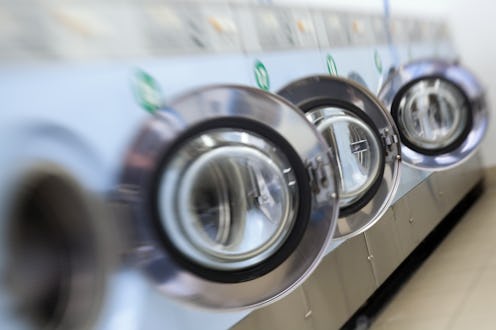Life
You're Probably Not Cleaning This Enough
Cleaning your home is a boring, tiring, and sometimes thankless job, but there's a big difference between a home that's a little cluttered and one that's dirty enough to make you sick. Strangely, the one thing you're not cleaning enough is itself a cleaning device. When was the last time you washed your clothes washing machine? If you had any idea of what's lurking in there, it would have been recently.
According to microbiologist Charles Gerba, the average just-worn pair of underwear contains some poop — around a tenth of a gram, yum. You might not be able to see it, but it's there. When you send those undies for a spin in your washing machine, germs from the poop bits (like hepatitis A, norovirus, rotavirus, salmonella, and E. coli.) swish all around and grow. Skin germs like staphlococcus are hanging out in that mix, too. The worst part about laundry germs is, since you think your laundry has just been washed clean, you probably do things like touching your face or food after you handle the washed loads. In reality, laundry that wasn't washed on hot should be basically thought of as still dirty, and you need to wash your hands if you touch it.
Modern washing machines may brag about their eco-friendliness, because they have the ability to get clothes looking clean at lower temperatures and using less water than ever before. But even visibly clean clothes can still harbor pathogens. Machines sometimes feature a "sanitize" cycle which is required to reach bacteria-killing temperatures for long enough to actually finish the germ-killing job. By extension, of course, that means that all the other cycles, the ones you actually use — cottons, permanent press, delicates, jeans — are not sanitizing, oops.
Between all the scents of laundry products and the neutral scent of genuinely clean clothes, you can be forgiven for thinking that your washer wasn't a germ pit. Or maybe you thought about this when you used a public laundromat (because everyone else's stuff seemed dirty), and now that you've got a washer in your own home you stopped caring. Hey, I get it, but at the end of the day, does it really matter whether the E. coli lurking in your "clean" laundry came from your poop or a stranger's?
To remedy the nasty situation, you can clean your clothes washer (high-efficiency or regular) using washer-cleaning tablets made for the job, or by running a hot, sanitize, or "maintenance" cycle with regular old chlorine bleach. That should kill whatever's building up in there, though each load of laundry presents a new opportunity for infection. To prevent your washer from becoming so dirty in the first place, leave the door open so it can dry out and never let washed clothes linger (moisture quickly becomes a breeding ground for whatever residual germs are in there).
If you want to kill germs in addition to making clothes clean-looking, add some bleach to laundry loads that will tolerate it and use the hottest water that your clothes can handle too. Disinfecting is not a job for essential oils and natural cleaning products, which might remove dirt but typically won't kill most of the pathogens. Treat the outside surfaces of your washer, where you sit "clean" and dirty laundry, with antibacterial wipes for good measure.
You might have to choose between caring for your clothes and getting them super clean, like if you have lacy lingerie that won't survive a long hot wash in one piece. It may be tempting to throw your undies in with a few delicate shirts bound for the cold and delicate cycle (or, worse, with some kitchen towels), but this is asking for cross-contamination. Though it's unclear how many people get sick as a direct result of bad clothes-washing practices, you won't be able to un-hear that poop-in-undies statistic, so better safe than sorry.
Images: Giphy (2)
